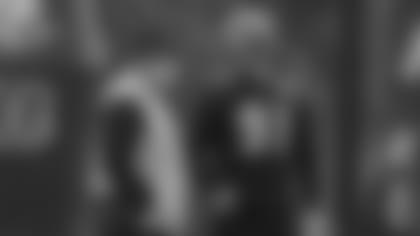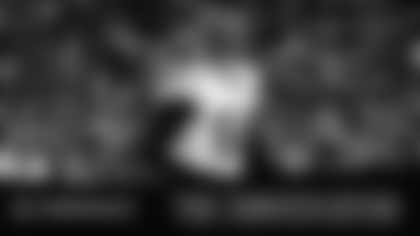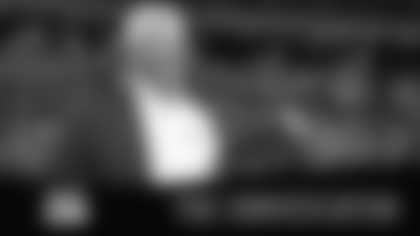Popular with and dedicated to his players, Bengals senior defensive assistant Mark Duffner unofficially starts his 50th year in coaching next week when he heads to his 28th straight NFL scouting combine in Indianapolis. The man who began his career as an Ohio State grad assistant watching Woody Hayes pluck roses and returned to the state five decades later to help a defense flower into the Super Bowl, has seen it all and back again.
Duffner, a New England icon who lost five games in six seasons as the head coach at Holy Cross, is also a Ohio legacy. After breaking in under Hayes, he became the nation's youngest defensive coordinator at the University of Cincinnati and is now in his second stint and 12th season with the Bengals.
Taking a break from finishing his 50-some-odd written player evaluations for Indy this week, he spoke with Bengals.com senior writer Geoff Hobson.
The conversation:
GH: From 1997-2024, what's the biggest difference at the combine?
MD: It's evolved into making it as player-friendly as possible. They're not getting dragged all over the place and all the things that could have gone on.
GH: And did go on.
MD: And did go on. The amount of time that you have to connect with the player is probably about the same. The players seem to be there longer now with different tests, mental, physical, and whatever else the league is doing. For example, the D-line will get in there on Monday and they will depart on Friday.
That's a long time. In the past, I think they might have been they're not quite that long. They spread that out. Media. All the things that go into it. But it still provides the evaluator, whether it be scout or coach, the opportunity to interview, to watch them compete, to see how they listen.
GH: When you broke into the NFL as the Bengals linebackers coach in 1997, the combine was the Wild West. There were no 18-minute appointments to interview players. Teams were on their own to get guys. They kicked media out of the hotel lobbies instead of credentialing them for news conferences and a media room.
MD: I had the privilege to learn from the Bengals staff at that time. Jim Anderson, Kenny Anderson, Coach (Dick) LeBeau and others on the staff in terms of watching and learning the proper way to try to get players to interview yourself and help in the evaluation process. Watch and learn, particularly what coaches were looking at during the workouts. It's come a long way since then.
You tried to find players to interview as quickly as possible over there in the Holiday Inn (the players' hotel) and grab them and get as many as you could. The players did get some designation of where to go and teams had requests, but it was quite a bit of a wild west, I guess you'd say.
It's gotten way, way better as far as that's concerned. I think the league has done a nice job, trying to organize it to make it less of that. Give every club the accessibility to each player where they can have a chance to interview them to learn a little bit about them through the interview process.
GH: All teams now have two suites in Lucas Oil Stadium to conduct business and interviews during the combine. Back then, each team had a room at the Holiday Inn and there was no interview schedule.
MD: You had to do quite a bit on the fly. When you had an idea where the players were going to be free, then you tried to grab them. I learned from Kenny Anderson. Kenny always had a great spot in the hotel where he could intercept players when they were on the move. He was with the quarterbacks, but I learned from him the appropriate points at the hotel where you might be able to head them off at the pass. Quite a few staff members were assisting me as a young NFL coach at the time.
GH: There wouldn't be as many people interviewing them as opposed to now, right? And there was no time frame.
MD: A little bit less as far as that's concerned. It would be members of that side of the football, the head coach and so forth. Still a good process within the rules to try to learn as much as you could about a draft prospect. There was still a time frame. Often people blew that off. There was less accountability. People would sometimes hijack a guy and take him up to the room somewhere or somewhere else and you'd have a hard time. But you did the best you could.
I'm very grateful to (Bengals president) Mike Brown and to Pete Brown (late director of player personnel) and the organization for helping me. Pete Brown was a mastermind in terms of evaluation process and had tremendous recall on all prospects. Not just mine or somebody else's position. All.
And I learned quite quickly from them in terms of what we were looking for and how to look at players and then have that experience to go out on the road to evaluate workouts and discuss players. That was invaluable for me. Pete could go to the board any time of year. Pre-combine, it was an evolving board. The board was always dynamic, not static.
GH: A real board, not in the computer, right?
MD: It was an actual board. A thorough board. Just trying to get a preliminary idea on players because we're always trying to look at them before the combine so you had some reference of evaluation and discussion. Pete was like a god-dang encyclopedia on every player. Without notes. I was amazed at the man's recall. His memory was phenomenal. He was incredible.
And all the weigh-ins. Pete, Mike. Katie (Blackburn). Troy (Blackburn). Paul (Brown). The weigh-in might be at 8 a.m. Whatever day it was for each group. They're there. We talk about being thorough in terms of the weigh-in process where you can look at a player's gait. You can look at his body, you can look at his arm length. It's all part of the process and they were not leaving that to anybody else. They were there, too. Very involved in that.
GH: Probably the only owners at the weigh-ins.
MD: That I ever saw. That I ever saw. And because of Jim Lippincott and other people, generally the Bengals got their spots early and they had good ones.
GH: You've been there as a linebackers coach, defensive coordinator and senior assistant. How are those roles different at the combine for you?
MD: It's not any different, really. As a coordinator, I was looking at other positions more than I do now and when I was a linebacker coach. Right now, I'm studying the outside linebacker/defensive end types. I still look at linebackers because that's what I've done forever and I'll give you my opinion. I try to help where I can in terms of whatever I see, but maybe when I was a coordinator, I wanted to be aware of some input on the front and on the back end.
GH: What does the combine mean in a coach's evaluation?
MD: It's just another facet of the evaluation process. I think it's a good one. With the Bengals and most teams, you've had time to write up and evaluate college film of the players prior to going, so you have an awareness, you have an opinion. I've already seen almost 50 edge and outside backers prior to this combine, so I've got a written opinion up to this point.
Some of these guys listed as edge players may be better really at outside backer, it's just how it's listed right now. And then each team will put them into the spot they think they should be.
I'd say a lot of the staff has done that, too, so you have some familiarity, some talking points when you visit with them. The combine allows you to just see the person, meet the person, and then watch them compete at the different combine activities. It's another piece of the puzzle. We've already started the process. This is another step in the process. We're information gatherers as we become player acquisition people.
GH: Any of the edge guys you've had here stand out at Indy?
MD: The guys I'm dealing with, Cam Sample, he was impressive. They all were. Joseph (Ossai) in a positive, impressive way. You came away checking them off a plus. Jeff Gunter. We met with all of them as a staff. Myles Murphy. We had a good visit with him. He didn't compete at the combine. We had an opportunity to meet with him. All that goes into it.
Then post-combine, if necessary, you go to a pro day or you go off on the road to have a one-on-one workout and meeting with them.
GH: As opposed to '97, are the players programed more?
MD: More prepared. As each year has gone on, it's like taking a class on combine preparation. They're way more prepared than they were years ago. I'm sure there was preparation then, but it seems to be even more now.
GH: How can you tell?
MD: Just the way they answer questions. Sometimes players, you know that they just spew out
answers that were programmed more than they are spontaneous. And I suspect to a degree, some of that's good. They've been preparing for the testing that goes on, the physical testing that goes on, they've prepared for the mental and personal interview, too.
GH: Is it harder to cut through the BS now?
MD: You can tell sometimes if someone's more prepared and genuine Yeah, you can tell that. That's why this starts the process of evaluation. You always want to make sure that you go deeper into your thoughts on the player.
GH: What are some of the most impressive combine performances through the years?
MD: Oh Geez. So many. I can't give you names in some respects. Just last year, I remember there were some of these defensive ends smoked the 40. Big people who can really run and can really jump. Every year you'll come away with someone that really tested well, and sometimes you hope that exceptional testing, whether it be the speed or the jumping ability, it correlates to production on the field.
Sometimes a guy stands out as a great tester but not as good a player and vice versa. Somebody that maybe didn't test as well at the combine or at the pro day you get disappointed, but when you put the tape on he's still a very productive player.
GH: Is there an interview that really stood? A couple?
MD: Unfortunately, I've had so many that I can't go, 'Wow, that Geoff Hobson one in 2004.' No. There have been very impressive, very heart-touching interviews and I think when you get a chance to see these kids and you try to continue to see them throughout the week where their schedule allows, you can size them up pretty well. I've been sitting there where I say, this is a hell of a kid, this is a great kid, this is a guy we'd love to have. Your appetite gets whetted and sometimes it can get stunted. Dimmed, if you will.
And you have to realize that this is not the end of it right now. This is early in the process and now you move forward accordingly.
GH: At the 2020 Senior Bowl, you guys coached linebacker Akeem Davis-Gaither and played against linebacker Logan Wilson and talked to them there. Did you still talk to them at the combine a month later?
MD: Oh my gosh, yes. You want to take advantage of every opportunity you can. Cam Sample, in particular (in 2021), was exceptional in the interview process. Joseph (Ossai) was good. Myles was good. If they weren't, they wouldn't be here.
GH: Is the interview the most important part of the combine?
MD: I think it's very important. It's also important to watch how they compete, to watch how they listen. Can they follow direction? Are they full of themselves?
GH: Can you tell?
MD: You can tell. It's just like any interview process and Thank God it's not just one interview. You get a couple of days to observe them in different ways. You might pass the group in the hallway. You can get out of it what you put into it. If you go there to try to learn as much as you can within the structure of the combine, then good.
GH: You've got a rep for having a great relationship with players. After the combine, you're known for leading the building in Zoom interviews. Is this the week your recruiting touch takes over? Especially with potential undrafted free agents? Probably not even half of those edgers and outside backers are going to be in Indy.
MD: Unfortunately, or maybe fortunately, once I start dealing with these players and talking with them, I get into hoping to get the chance to have the privilege of coaching them and I get my heart broken numerous times around the draft. Either a guy I was hoping might fall to us that I had a really strong relationship with is gone, or someone that I hoped that maybe they didn't get drafted we'd have a chance to sign them or have them here.
I lose them somehow. Which I don't want to lose, but sometimes it becomes a money issue. I tend to get a little too personal with them.
GH: No different than going into a living room in Framingham, Mass., as the head coach of Holy Cross to recruit.
MD: The only difference is that here they listen to me a little more because you do have the money. You have a scholarship in the past, but we do have the money. They tend to listen to you a little more fervently now. In terms of the NFL, it's the highest possible opportunity you can achieve and then you've got money. It's very similar. I have to get away from that in some respects because like I said, I'll get too emotional. Sometimes if you get too involved, it can sway your evaluation because you like the kid.
GH: Were you surprised with your popularity on social media with the catchphrases in the postgame locker rooms?
MD: I have no idea about any of that. That was Coach (Zac) Taylor. He was the author of that. 'They've got to play us.' And all I did was blurt it a couple of times and it became something. If I contributed in any way, shape, or form to positivity around this building, God bless. I'm thankful.
GH: Did your kids ever ask you about it?
MD: Heck, yeah. And I'd say, no, that's not me, that's Coach Taylor. I just yell it out. If it's going to help with the enthusiasm for Cincinnati Bengals football, amen. Let's do it.
GH: Best college players you ever coached?
MD: Positionally, (linebacker) Harry Flaherty was a great player at Holy Cross. He's their all-time leading tackler. Great, great player. Howie Kurnic was a great nose guard I had the privilege of coaching at the University of Cincinnati. Highly competitive guy. I mean, there's a lot of them. I didn't coach Gordie Lockbaum, but he was a great collegiate player.
GH: How about some of the best pro players?
MD: Takeo Spikes, clearly. Brian Simmons. Nick Barnett. Paul Posluszny. Daryl Smith. Lavonte David.
Kwon Alexander. Certainly having the privilege being around Trey Hendrickson, Sam Hubbard. In my mind (Hendrickson) is ascending.
GH: Hubbard played hurt this past year.
MD: A lot. Probably three-quarters of the year. You talk about what it's all about to be a team player, a team-firster, that's what he is. Quality people. Are you kidding me? I've been blessed to be around tons of great players.
I had the privilege to be around James Francis at the end of his career, a very darn good player. But shoot-fire, when I think back on some of the great players, there is Mike Peterson in Jacksonville. He and Daryl Smith and Paul Posluszny are the top tacklers of all time in their franchise. I go from there to Miami, where I had the privilege to coach some good players, and then go to Tampa where I get Lavonte David, Kwon Alexander. I mean, Geezo Pete.
GH: You have a great ability to remember players' birthdays. Who is the oldest you recently called?
MD: I do it often. Harry Flaherty's birthday is Christmas Eve, and I communicated with him just last year.
GH: When was his last year with you?
MD: 1983. He's the Fellowship of Christian Athletes director in New Jersey. I reached out to him. Takeo, Brian. All those guys I still talk to. I talked to Nick Barnett not too long ago. Lavonte David, I was in touch with him during the season to congratulate him. I texted Kwon Alexander when he got hurt. I hope he's going to heal quick.
We don't just work together for a short time. When we work together, we work for life.
GH: What's it like working for Zac Taylor, a guy who was born the year Harry Flaherty last played for you at The Cross? Like you, Zac seems to have a good sense for people, players, the locker room.
MD: Yes, I think he's got a very good ability to read the pulse of his team. I think he creates an environment that's very winning-centered, very close, team- oriented. I'm very impressed with that and you've got to work at that. That doesn't just happen. It starts also, though, in the player acquisition process through the draft and through free agency, where I think Duke (Tobin) and his staff and the coaching staff and, in fact, the whole organization, need to be congratulated in the fact they recognized components for that.
You have to have high character people who are highly competitive, but they're We People vs. I People. We've all learned that and the more you steer yourself towards that type of player and person, the better chance that you have to be successful and that's been a collective effort, but headed by Zac, certainly, and Duke and Mike.
GH: Best Woody Hayes story.
MD: I could give you days. One would be in 1975. We're playing the University of Michigan. We're playing it on Saturday, Nov. 22. We're undefeated. We're in Ann Arbor. We come from behind to beat the Wolverines to go 11-0 and secure the Rose Bowl berth. After the game, bedlam. People going nuts.
Coach Hayes tells the team, 'Today men, it took unselfishness. It took genuine appreciation for one another. Great competitiveness. Execution. Care. Love for one another for us to beat this opponent. Our country hasn't been the same since an assassin felled President Kennedy 12 years ago today. When we go back to Columbus, I want you to bring those traits back to our campus and make this place better.'
That's what he says after the game. We get back to Columbus and there are 10,000 Buckeye fans and roses everywhere. Rather than leading the cheers and accepting the plaudits from the crowd, he grabs a bunch of roses under his arm. Goes to Riverside Hospital and for three hours before his TV show at 11 o'clock or 11:30, every patient he could visit he went into and gave them a rose. That's Woody Hayes. Phenomenal
GH: Years later when you were at Holy Cross and he was retired, didn't you sit with him in a car in Boston talking football?
MD: On the campus of the Harvard Crimson. Where he spoke on the 100th anniversary of Ralph Waldo Emerson's death. Among some of the best literary minds in the world. And he beat them all.
We stayed on the stage talking to him until they threw us out at about 11 o'clock and then we sat in the car until 1 a.m. with myself and a couple of our coaches. He was a giver.
GH: You'd have to say so are you, Duff. See you in Indy.
MD: We're in it to win it.















